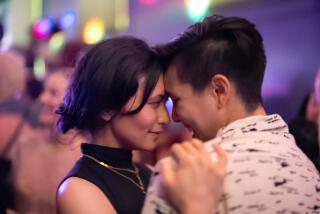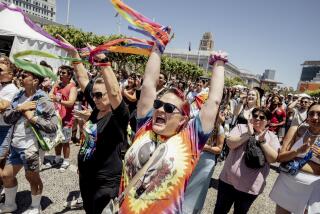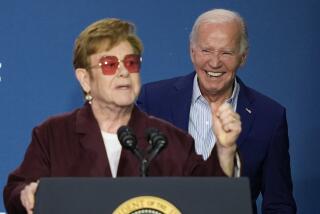Life, Liberty, Pursuit of Happiness--Gay or Straight
This Sunday morning, the 28th annual Gay and Lesbian Pride Parade will take fabulous flight along Santa Monica Boulevard between Crescent Heights and San Vicente. The weekend’s events commemorate the 1969 Stonewall Uprising in New York City, when patrons at a Greenwich Village gay bar fought back against routine police harassment and sparked the gay liberation movement.
Los Angeles’ parade has always seemed special to me, not just because I live here, but because this city hosted the beginnings of the modern gay movement. Founded here around 1950, the Mattachine Society, the Daughters of Bilitis and One magazine pioneered what Stonewall ignited into a mass movement. The L.A. Gay and Lesbian Social Services Center is the largest such center in the world. Such writers as Christopher Isherwood, Joseph Hansen and Patricia Nell Warren were models for a burgeoning gay literature. These are but part of the story of gay Los Angeles.
For lesbians and gay men, their friends and families, pride parades are an annual holiday to be celebrated--or avoided--like any other holiday. But our neighbors and fellow citizens may wonder about the reasons for gay pride. Here are some:
* We take pride in our history. Socrates and Wittgenstein, Leonardo and Michelangelo, Sappho and Whitman, Proust, Cather, Gide, Stein, Cavafy, Mann, Auden and Mishima, M. Carey Thomas, Thornton Wilder, James Beard, Bayard Rustin and Allard Lowenstein, Tchaikovsky and Samuel Barber, Lorenz Hart, George Cukor, Travis Banton and James Baldwin are but a sampling of the historically memorable people who were lesbian, gay or bisexual.
* We take pride in our sexuality. Gays are routinely criticized for flaunting private things in public. But American culture is not about our sex lives but about the relentless selling and instruction of heterosexuals in what is supposed to be their natural inclination. Gays make a public point of our sexuality because secrecy is not a substitute for constitutionally protected privacy, which we do not yet have.
* We take pride in our survival. Born into families that do not welcome us, into communities, religions, ethnic groups that disdain us, faced with a culture that still has little place for us, we must make our own ways. We should and do take pride in having survived the thousand petty harassments and reminders of a special status we neither seek nor merit.
The parade is important too because it is a time when we can take pride not only in ourselves but also in one another. Especially since we share no common religion, race, class, region or lifestyle beyond a stigmatized minority sexual orientation, we have always to learn how to see ourselves in one another.
It isn’t just the straights and the media who complain about the drag queens or the “dykes on bikes.” Lots of us worry about our public image and project our own sense of the appropriate onto people whom we would rather not be associated with. I would not want to see a parade without those tough girls and lovely men. They remind me of parts of myself I have tried to stifle, and they give me joy and heart.
If all this doesn’t make sense, perhaps one last thing will. We take pride because in parading who we are, from the inside out, gay men and lesbians are celebrating everyone’s freedom. In a time when the world is beset by a craving for orthodoxies and conventions imposed on individuals from the outside, we are proud to represent the possibility of individuality. Taking pride in being gay is another way of taking pride in a nation dedicated to life, liberty and the pursuit of happiness.
More to Read
Sign up for The Wild
We’ll help you find the best places to hike, bike and run, as well as the perfect silent spots for meditation and yoga.
You may occasionally receive promotional content from the Los Angeles Times.






